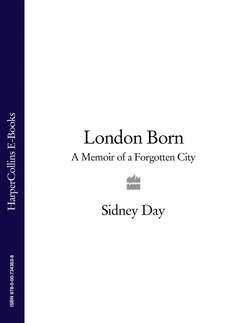Читать книгу London Born: A Memoir of a Forgotten City - Sidney Day - Страница 9
IV
ОглавлениеEverybody thought the world of me mum. Everybody in the Bay who had children, me mum brought them into the world. I don’t know what people said about the rest of us cause we was always up to villainry, always. But compared to the others in the street we was pretty prim and proper, our family. We wasn’t dirty and scruffy. Oh blimey, some never washed for bleeding weeks in the Bay.
Me mum always wore a black dress with a potato sack taped round her as an apron. She was always cooking or round the wash pot. She worked from about six in the morning till she went to bed, doing housework and washing and ironing. She did all the washing for the Booths as well as bringing them into the world. More or less anything wanted doing it was, ‘Go and see Dinah, she’ll do it.’
She would stand for hours at the copper in the scullery with a big white bar of Lifebuoy soap, rubbing and squeezing the clothes. We helped her by keeping the old copper going. We chopped wood to feed the fire and sometimes we burned old lino. The copper used to boil lovely when you put that on. Lots of houses had green or red lino made of tar, and it was thrown out when it got too cracked. When somebody burned lino the smoke outside was thick and black.
We took turns putting the clean clothes and linen through the old iron wringer. Then Mum emptied the copper of all the water. At Christmas time we boiled the ham and the potatoes in that copper cause there was so many of us to feed. Every year me mum also used it to steam eight Christmas puddings and we usually ate the last one at Easter.
Me mum was the pawn shop runner for the whole street. She got so much in the shilling off people to take their stuff to and from the pawn shop, or ‘Uncle Bill’s’ as all pawn shops was known. All of us was in the same boat as far as money was concerned. Two pound twelve and sixpence a week was an average wage. We had to pay everything out of that—food, clothing and health insurance. In the building game there was no such thing as a regular job. The money never lasted the week so most families got by with the help of the pawn shop.
‘Uncle Bill’ took in people’s valuables and clothes and charged a penny in the shilling when they bought them back. Every Monday morning me mum would do up her hair in earmuffs, put on her bonnet, tie the ribbons underneath and get out the old Bassinette pram. She would take me dad’s waistcoat and war medals, put them in the pram, and set off for the pawn shop on the corner of Tufnell Park, by the tube.
As she went along the street people hollered out to her, ‘Take this for me Day-o,’ and she would pile everything into the pram. She took it in Monday, pawned it for the week, and then brought it back on Saturday. Going down Dartmouth Park Hill on a Monday with all the stuff was alright, but coming back up on a Saturday was a push—it was terrible. The pram was loaded right up high with parcels and it near took her all bleeding day.
We took it in turns to go with Mum to the pawn shop and help her push the pram. We would pass lots of other people on the streets, and cattle, pigs and flocks of sheep on their way to London Caledonian Market.
When we got to the shop she would go into a cubicle. The shop was divided into cubicles so nobody could see what you had to pawn. We stood and waited for ‘Uncle Bill’ to fill out the tickets. Then it was home, back up that hill. Me poor mum, what with that and all the washing, ironing and cooking, she was worn out before she died, poor old sod.
